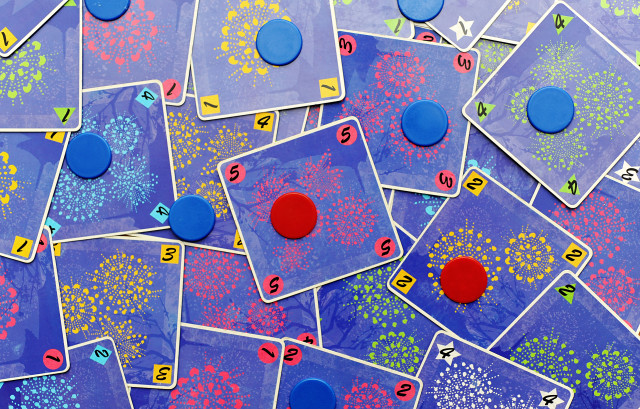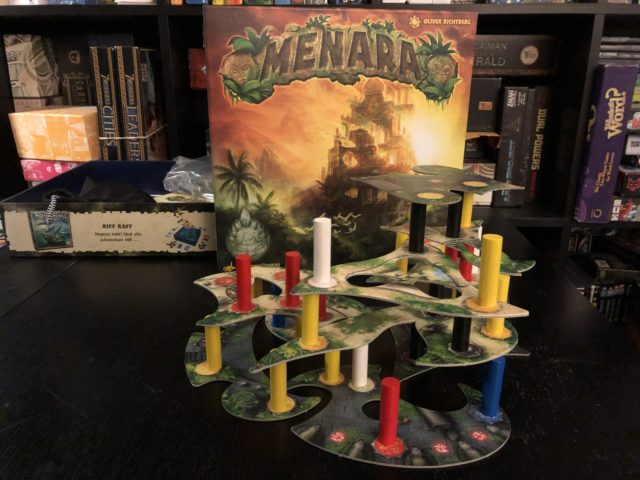Whenever I talk about a co-operative game I inevitably feel the need to comment on whether it does or doesn’t avoid what has come to be called “The Pandemic Effect”. The term refers to the tendency in co-operative games for an alpha (ie bossy) player to simply take over direction of the game.
Of course, the phenomenon existed before it was named. In RPG’s a common challenge for a gamemaster is preventing one of the players from simply stage-managing the party through the whole adventure. There, though, the GM has a whole arsenal of tools at their disposal, from Mute spells to simply killing bothersome players off (extreme, true).

The first “modern” co-op game was arguably 1981’s Sherlock Holmes: Consulting Detective, which has recently been re-released and is a no-brainer buy for any Sherlock fan. Its rules simply assumed players would work together to figure out Sherlie’s next move. Ditto Arkham Horror first released in 1987 and recently updated to its third edition.
After Pandemic was published in 2008 and gave rise to its eponymous Effect, both players and designers realized that there was a need for solutions that were incorporated into the design of the game itself, and not simply rules that said, in effect, “don’t talk about what’s in your hand”. No, what I’m assuming here is that you’re looking for a good co-operative game for your group but you want to avoid the Pandemic Effect. It’s interesting to see how different designers have tackled the problem and come up with different solutions.
For the purposes of this listicle I am purposefully avoiding semi-cooperative games such as Castle Panic or Archipelago. These are games where there is an individual winner but players must co-operate to avoid something bad happening because then everyone loses. Such games have a different problem: a player who has no chance of winning can often sabotage things, thereby robbing a rightful winner of their victory (table-flip territory if I’ve ever seen it).
I am also not including hidden-traitor games (Shadows Over Camelot, Battlestar Galactica, The Resistance, etc.) because there bossing other players around becomes part of the meta–it’s a feature, not a bug.
Here we go, in chronological order:
Break The Safe (2003): This game is miraculous for several reasons. It came out five years before Pandemic, was published by Mattel of all people–therefore, it was a mass-produced game available at toy stores–AND it was a hella good co-op playable by the whole family! You and up to three other master spy-thieves had to break into a lair and steal the secret files in the safe, and you had to do it in 30 minutes real time. Sure it was roll-and-move–but that just added to the suspense as you dodged guards and attack dogs and tried to make it in and out. The uncredited designer understood that time pressure was one way to undermine the Pandemic Effect; bossing people around takes time! Later co-op games like Space Alert, X-COM, and 5-Minute Dungeon all use the same method, but Break the Safe was first, and if you can find a copy it’s definitely worth it.

Hanabi (2010): Headbanz and Code 777 are games where you can see everyone else’s information but are ignorant about your own. Antoine Bauza took this idea and made a game where players had to co-operate to play their hands of cards (or tiles, depending on the edition you have) in a collectively specific order. Hanabi short-circuits the Pandemic Effect through imperfect information: everyone knows something but no one knows everything. Playing with open hands would defeat the whole challenge and purpose of the game. Recently Wolfgang Warsch morphed this idea using dice instead of cards/tiles and produced the excellent Fuji, which (coincidentally or not) shares a Japanese-flavoured theme with its spiritual ancestor.

Magic Maze (2017): Four adventurers are trying to break into a maze-like mall, steal stuff, and leave. Yes, there’s a time limit, but what sets Magic Maze apart and prevents Pandemic Effect are two unique mechanics: (1) each player is in charge not of an adventurer but on particular direction(s) of movement; anyone can move any adventurer at any time in real time, and (2) after the beginning of the game, except for certain special times, there is no talking allowed. Talk about Mute Spells. (2018’s The Mind also uses this limitation to great effect, of course.) These two things mean, for example, that if you need to move the dwarf north towards the exit, but the mage is blocking him, but can only move east, and the person in charge of “easting” is unaware of your predicament, that you have to grab the Big Red Pawn, slam it down in front of them, and stare at them intently until they figure out what they need to do. Magic Maze is endlessly challenging at eighteen different difficulty levels, and the recent Maximum Security expansion adds even more mayhem. There’s even a kids’ version now for some reason, though the original game is perfectly playable by kids since there is no reading involved.

Codenames: Duet (2017): Either the best or the worst Date Night Game ever. This takes the basic word-association-cluing mechanism of Codenames, but you and your partner only have a certain number of clues between the two of you to find all the Agents. True, by imposing a specific clue limit it is not dissimilar from time-limited games such as Break the Safe…but because the constraint is not a real-time one the vibe of this game feels much more puzzle-like (though just as tense) and I feel deserves its own listing.

Menara (2018): The thing that makes Menara special is that it’s a dexterity-based strategy game: players are working together to construct a jungle temple consisting of tall wooden pillars and irregularly-shaped cardboard tiers. So no matter how bossy you are, when it comes down to it, each players has their own moment of truth when they place or move their piece(s). Short of actually taking over and doing it for them (which, really, if you do that you need to seek help) there’s nothing to do but sit back, sit very still, and hold your breath.
[…] onboarding for both n00bs and veterans. Being fully cooperative and with no mechanic to prevent the Pandemic Effect is a strike against it, at least for some. But if you are looking for a game to introduce someone […]